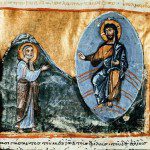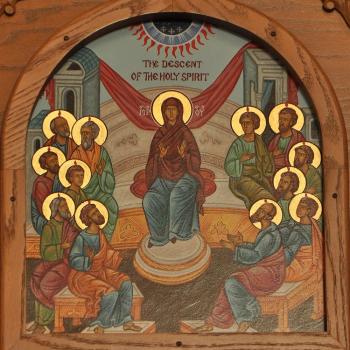![Descent of the Holy Spirit. 12th century icon. [Public domain], via Wikimedia Commons](https://wp-media.patheos.com/blogs/sites/637/2017/06/Descent_of_the_Holy_Spirit_icon_12th_century._National_Museum_of_Georgia-232x300.jpg)
But the absence of a special sacrament does not mean that this side of the life of the spirit is deprived of grace. This is also true of other aspects of human life that are not sanctified by any special sacrament. Spiritual birth in baptism, the gift of the Holy Spirit in confirmation, and communion with Christ in the Eucharist imply the sanctification and benediction of all human life, and in particular of the power of spiritual love, which manifests itself in human relationships insofar as they are not corrupted by the fall. The natural powers are nourished by the grace of the Holy Spirit in conformity with the general power of churchly life.[3]
Likewise, just as we saw there were special ways in which the grace of baptism could be received, we must remember, the Spirit is not ruled over by the sacraments but rather, the Spirit is their Lord, the one who set them up as the norm by which the graces in the sacraments are received. The order which is established for their reception does not have to be seen as an absolute, even as the means by which the sacramental graces are received. Thus, we find some in Scripture apparently gifted with the anointing of the Holy Spirit before being baptized:
While Peter was still saying this, the Holy Spirit fell on all who heard the word. And the believers from among the circumcised who came with Peter were amazed, because the gift of the Holy Spirit had been poured out even on the Gentiles. For they heard them speaking in tongues and extolling God. Then Peter declared, “Can any one forbid water for baptizing these people who have received the Holy Spirit just as we have?” And he commanded them to be baptized in the name of Jesus Christ. Then they asked him to remain for some days (Acts 10:44-8 RSV).
Like in baptism, we find the Holy Spirit can give extraordinary grace to those the Spirit chooses to do so, enlightening them with the same grace which is normally bestowed by the sacrament of confirmation. Just as with baptism it is not for us to assume this is the case for anyone, and so we must witness to the norms Christ established for the church, encouraging others to receive what Christ told us to receive in the manner he told us to receive, so we must not assume others have been enlightened by the Spirit even if they appear to be Spirit-filled. We must encourage them the best we can, with mercy and grace and therefore not in a demanding fashion, that the follow the norms set up by Christ and receive baptism and confirmation. If, for some reason, they do not do so, we cannot know nor judge their status in relation to the graces given out in the sacraments. What we do know is that when we know and understand what is expected of us, we should follow through with loving obedience and receive the sacraments through the ministry of the church.
Many who have been baptized but not confirmed wonder why they should get confirmed. To them, it seems as if it is not necessary. They are baptized. They receive communion. Yet, the full reality of the Christian life is not possible without it. It is what makes them Spirit-bearers and fully participate in the life of Christ. Without it, their initiation is incomplete; they have grace through baptism, but they have not been strengthened and fully joined themselves into the ecclesial community. It is not to be seen as a sign of temporal maturity, as if only those who are older and so decide to receive the sacrament can and should do so as a sign of confirming their faith in Christ; rather, it is meant to confirm them in the Spirit, to give them their full Christian potential. It can be given to those who are infants, and this is indeed the norm in the Eastern traditions. It is a sacrament, a mystery, which offers grace and does not require human comprehension for its grace to be effective. Rather, just like in baptism, the recipient has to be open to its graces by putting no intentional barrier between themselves and its reception. In the West, chrismation was split from baptism to help with its missionary work. As the West normally had bishops presiding at confirmation, and not just in the blessing of the oil, this separation of the two allowed priests to baptize and gift graces to the would-be convert without having to wait for a bishop to meet with them and offer them confirmation. While it was ordinarily understood this meant the baptized initiate would not receive communion until confirmation, this changed recently in the West, when the age of first communion which changed without a changing of when the sacrament of confirmation was given out, thus making confirmation itself appear to many in the West to being a secondary and inconsequential sacrament.
No sacrament should be viewed as inconsequential; chrismation is a part of the initiation into the life of Christ and the Spirit, allowing its recipients to integrate the two revealing hands of the Father into their lives. While, due to all kinds of economia, the West allows communion and other sacraments even if confirmation has not been received, the norm is to see confirmation as being before communion and what verifies the person’s initiation and preparation for communion and the rest of the ecclesial life. It is important and should not be neglected; without it, a believer is not being strengthened as they should by the Spirit and so do not have the full treasury of graces needed for the Christian life. To truly be a Christian, being christened in the Spirit is necessary. Christ received the Spirit after baptism, and so should we – to deny it can lead to our own undoing.
[1] St. Diadochos of Photoki, “On Spiritual Knowledge” in The Philokalia: The Complete Text. Volume One. trans. and ed. G.E.H. Palmer, Philip Sherrard, Kallistos Ware et. (London:Faber and Faber, 1983), 260.
[2] Andrew of Caesarea, Commentary on the Apocalypse. Trans. Eugenia Scarvelis Constantinou (Washington, DC: Catholic University Press, 2011), 121.
[3] Sergius Bulgakov, The Comforter. Trans. Boris Jakim (Grand Rapids MI: William B Eerdmans Publishing Company, 2004), 330.
Stay in touch! Like A Little Bit of Nothing on Facebook:
A Little Bit of Nothing













